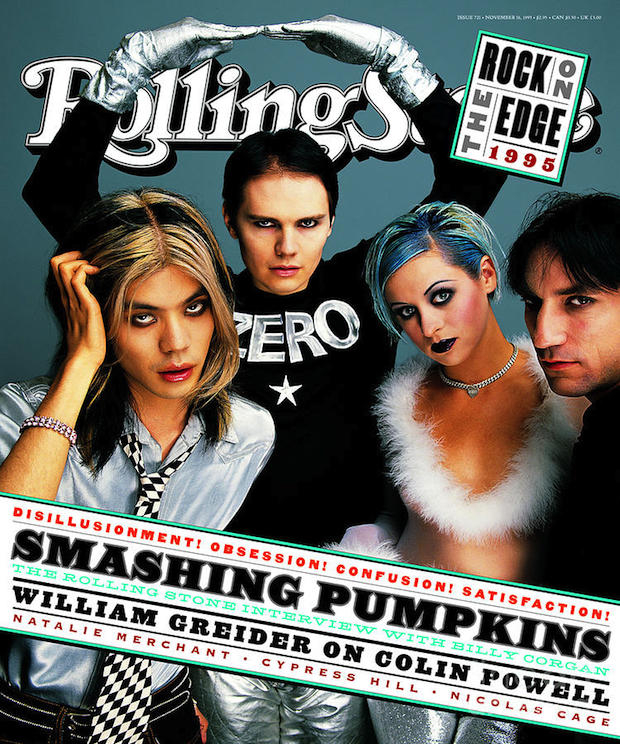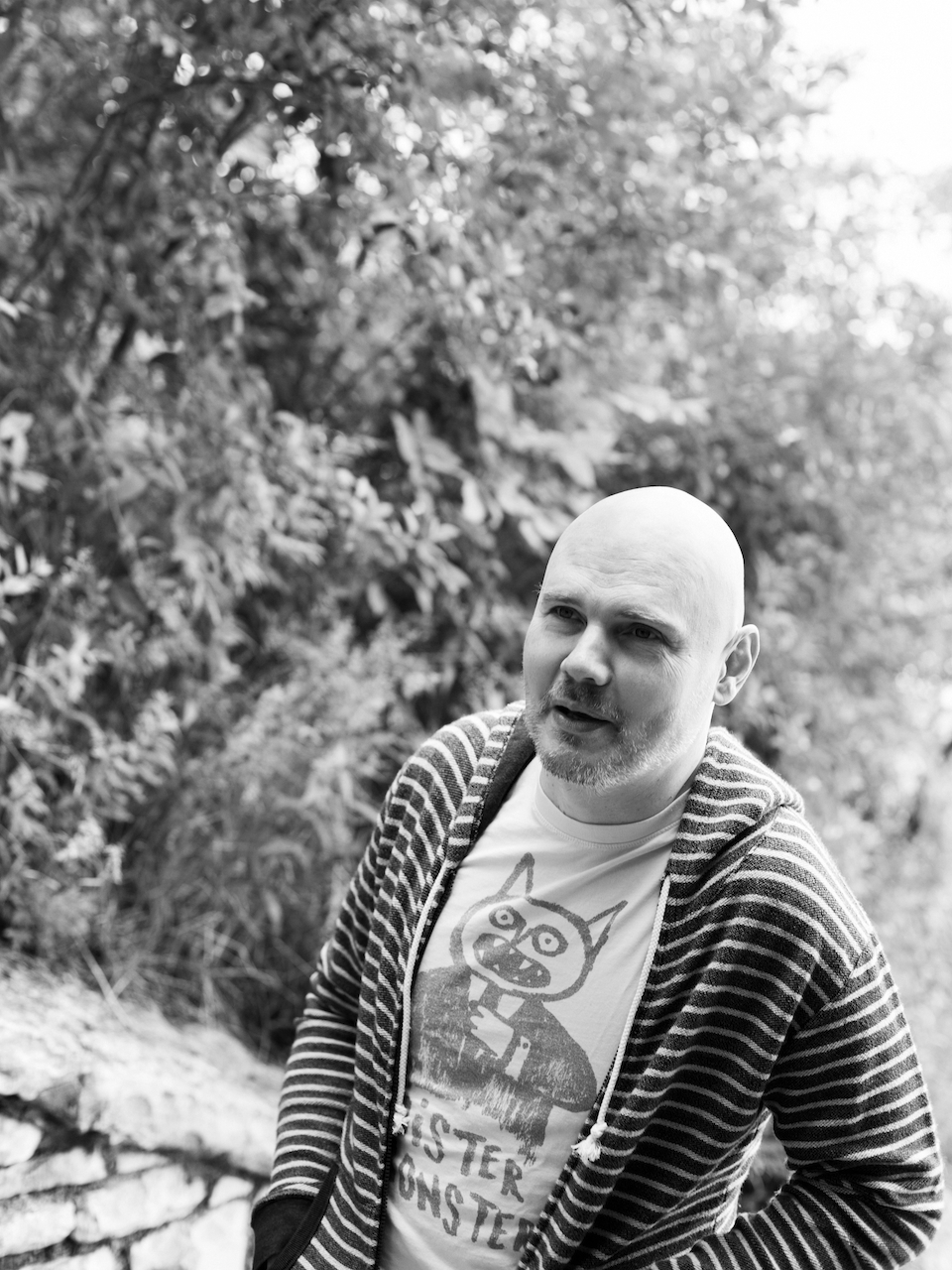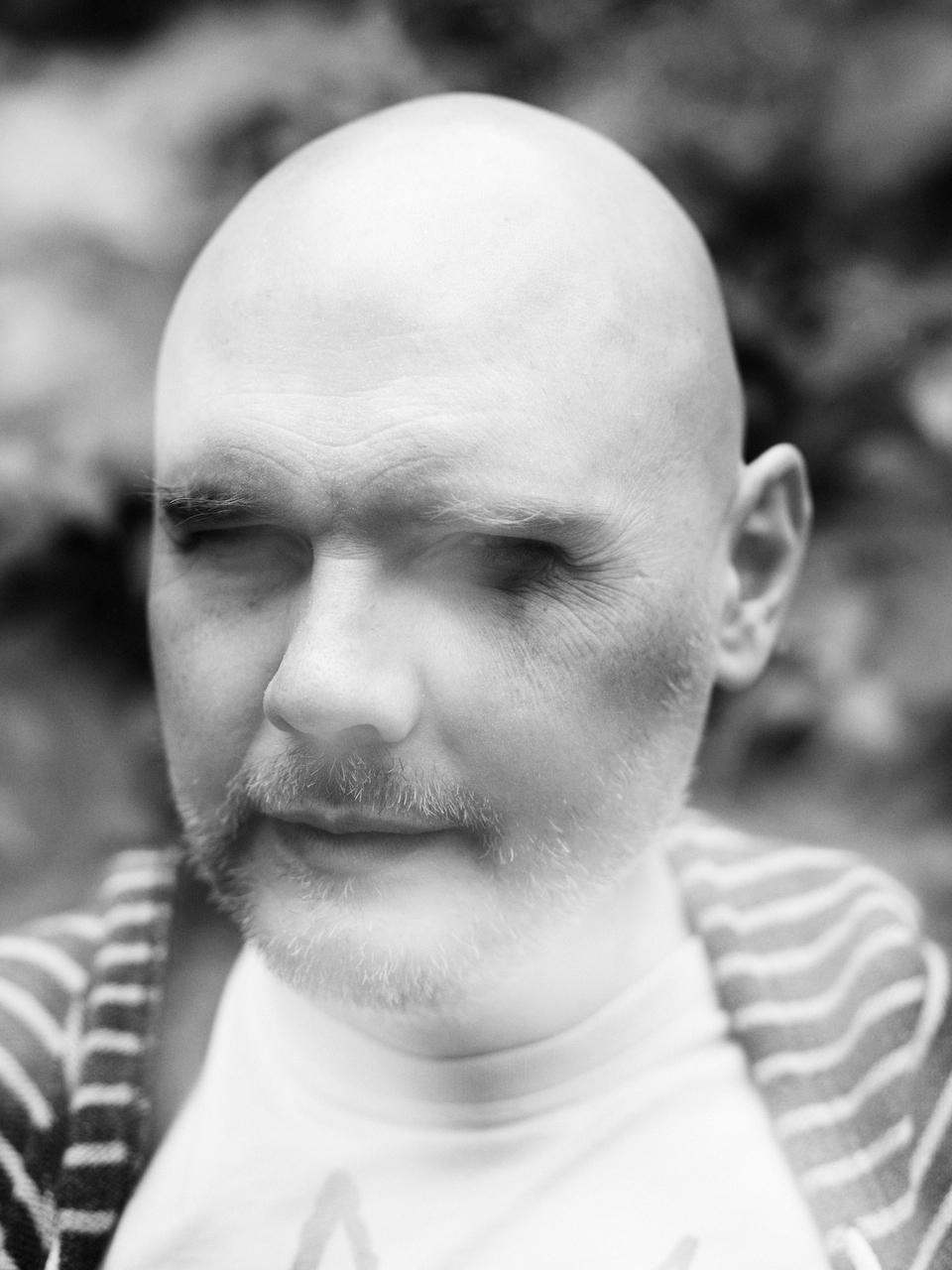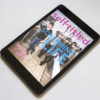The following story is taken from our free iPad magazine. Grab it via iTunes or check out more exclusive stories here…
As told to ANDREW PARKS
Photography BRIAN SORG
I wanted to be a drummer actually. Of course, when you’re 4 or 5, the last thing someone wants to hear is you playing the drums for more than a minute.
My uncle had a great record collection. Before I was 10, I was listening to Yes, Black Sabbath, Jethro Tull, Queen, but I was also listening to pop radio—the biggest dreck from the ’70s. Then I started discovering little pieces of alternative culture like the Ramones, the Plasmatics and Adam Ant. I’d hear all these different voices and think, ‘What the fuck?’ Living in suburbia, there was no way to dial it up on YouTube. You’d come across a compilation, album, or sometimes a clip on television, and it wouldn’t be connected to anything.
I remember talking to a guy who had seen Mercyful Fate and it was like the holy grail. ‘Oh man, you saw Mercyful Fate.’ It was mythical—shadows and reflections. I didn’t have a lot of money so these people existed in my mind. I created things that weren’t there, and of course later, I’d either meet these people or work with them and get the real story, get to compare my notes against what really happened.
I’m an acute listener. I can hear the humanity in the music. Like I don’t know Robert Plant, but I’ve met him a couple times. People get into the whole rock god, bare-chested bit, but I picked up on the fact that he’s a hippie. And when I talked to him, I got that vibe.
This sounds a little self-mythologizing, but nobody got my take on the world except my mother. Everyone else treated me not even as a black sheep. More like a blue one.
My mother told a story once. Her future husband was getting upset about the advent of free agency. I said players deserve to be paid, and he said higher salaries were bad for baseball. Then he realized he was arguing with a 9-year-old. Like ‘who is this child?’
The guitar was weird. I didn’t connect with it intimately until I saw a friend playing. I had a great attraction to music, but never a linear thought of ‘me plus guitar equals future’.
When I got that guitar in my hand when I was 14 years old, it was like, ‘Ding, ding, ding!’ That was it; I never looked back.
There was a sense of destiny about the whole thing. I’ve had plenty of time to muse over why. I think it’s as simple as how some families have a talent for cooking or opera singing. And there’s a talent in my family for the guitar.
I was a total jock. The reality of it was I didn’t make the team in my freshman year of high school. So between that, and taking care of my special needs brother, I needed something to do. Like, ‘If I have to sit in front of this television, I might as well practice the guitar.’ If I’m not gonna be on the team, why am I out here in the driveway shooting jump shots? It was that combination—’fuck it, I’m going to go down this path now.’ I took it pretty seriously for a 14 year old.
I was totally self-taught, and immediately set out with an intense practice regiment. I took it on, you know? Songwriting is the only other thing I took as seriously as the guitar. Everything else was more of a shrug of the shoulders. I was an honors student; I was offered Pell grants and Fulbright scholarships. My family freaked out when I decided to go into music.

People will say, ‘Do you not love what you did?’ And it’s like, ‘Are you kidding? Do you know what I went through to hatch that egg?’
Being on the cover of Rolling Stone. That’s one of those universal indicators of arrival, when everyone’s like, ‘We were wrong; he was right.’ But by then, I’d gotten over the need to be right. It was like a posthumous award—’Oh, I could have used this seven years ago.’
In my hall of justice, Bauhaus deserves to be at the top. Black Sabbath. Cheap Trick. The Cars.
I’m really attracted to pioneers—the moments where someone’s on the edge of something. When you listen to Black Sabbath, the language of heavy metal is being codified. With Bauhaus, you hear the codification of goth music. The audience boils it down to a sentence but there’s evidence of other things. Like in the beginning, Sabbath was bluesier and Bauhaus was artier. These transitional phases are really fascinating.
I’ve accepted it—I’m a weird guy. I like what I like and nobody’s getting hurt by it, so the Pumpkins is my laboratory for developing those things into a cohesive pop statement.
If you say in an interview that you feel misunderstood, people kinda throw their hands up in the air and say, ‘Jesus Christ, what does that fucking mean?’ But on a personal level, I’m a human being, right? And I don’t feel understood in the world.
My favorite is when someone takes something I did that was once risky and uses it to beat me up. ‘Why don’t you keep doing that thing you used to be known for? And why are you doing this new thing you’re going to be mad fun of for?’
Not to take anything away from people I work with, but I think they’d agree my vision is very much my own. They’ll often ask, ‘What the fuck is this?’ And I don’t know. I don’t have an easy answer for why I’m trying to combine Abba with Black Sabbath.
People will say, ‘Do you not love what you did?’ And it’s like, ‘Are you kidding? Do you know what I went through to hatch that egg?’
I’ve always been given this question mark next to everything I do: Is it because of the band? Is it because of the producer? So I’ve had to defend myself, which ends up looking stupid.
I’ll give you a perfect example. When I worked on Courtney [Love]’s Celebrity Skin album, she had gone through a really rough time and reached out to me. We had this common ground, so we worked together and had this agreement where we would basically put a pleasant parentheses around the work. Because of course, she knew she was going to be questioned: ‘Well how much did Billy do?’ So the other day I was going through a pile of stuff, trying to sort out some old papers, and I came across a press clipping that must have came out when the album came out. It was from a local paper: ‘Love says Billy did barely anything on the album.’ That article came out at the same time as when I did a bunch of press in Europe, talking very positively about the work I’d done with her. ‘Oh, it’s a great album. And I think it’s really beautiful. We did this great work together.’ So as these articles are coming out, everyone’s writing articles about what an asshole I am for taking credit away from this total feminist. That’s the kind of stuff you laugh at now because then, when you ran around defending yourself, saying, ‘No, I did write this song,’ it made you look like some kind of weird schoolyard bully.
Now of course—15, 16 years later—people on the street will tell me that’s one of their favorite albums and they appreciate what I did for it. That’s where the satisfaction comes in. In the moment, you’re not going to get that satisfaction.
“At the risk of stepping in another pile of shit, there’s a level of criticism to levy at this subcultural world that occasionally claims me”
It goes back to that cultural conversation. In the heat of the moment, something comes out and that discourse begins. ‘Well, it’s not on my Top 10 list.’ All this kind of shit—list-making, this is the greatest thing ever, this is the worst thing ever. If you get drawn into that in the heat of the moment, you end up doing things that ultimately make you look bad. You’re sort of expected to rise above the fray.
Playing Pumpkins music is like walking into a buzz saw between fans of different albums. It’s 19 voices competing for what the future should sound like, how the past should be represented, who’s in the band, who’s not in the band. I wouldn’t wish that on anyone.
Modern American culture has descended into a crazy level of politics—indie stars rising to the level of genius, then being cast aside in the matter of an hour. Artists who haven’t had time to develop are being ascribed depth they don’t have. They don’t even have their bullshit patter down.
If you look at another era—like Elvis—it took the American public two or three years to realize, ‘Okay, yeah, he’s the real deal.’ There was a process in place that included vetting out multiple hits, social discourse, people trying to kill him off, people refusing to show his swinging hips. It was a whole movement, and in that process, the artist himself evolved.

There’s enough metadata on the Internet at this point to know it’s really a hall of mirrors. We’ve all fallen into propaganda. So at least with my propaganda, I try to be transparent.
We’re all running our own media campaign. I don’t always like it, but I’m cool with it now, whereas I wrestled with it before: ‘This is really fucked up. This is not why I picked up a guitar.’
Maybe it doesn’t add up to commerce in the ways we’d like, but the transactional energy is adding up over time. The grander accomplishment of the band is being realized through the way people connect information, whereas in the past someone had to be a pretty dedicated fan to even get the narrative point. Because from the outside, it looked like a total fucking mess.
At the risk of stepping in another pile of shit, there’s a level of criticism to levy at this subcultural world that occasionally claims me. This simple thing gets put out there: We’re the authority, and if you wear this T-shirt or grow this beard, we’ll accept you. It’s very similar to the schoolyard. If you don’t beat up Johnny, they won’t let you hang out.
The turning point for me was realizing this a decade too late. Back when I was in a relationship with Courtney [Love] in the early ’90s, she was savvy enough to realize these things weren’t real. I bought into the methodology that the indie world played by a higher set of rules, that justice or great work would win.
What was the argument? That everyone who listened to Sonic Youth wouldn’t listen to band Z. That was promised to us in the late ’80s and early ’90s: If you do this or that, we’ll embrace you. But they were never going to embrace the Pumpkins.
Well I am slightly maniacal. What adds to the egoistic confusion is I’m a person who completely possesses what he’s into at the time, and when I’m done, I move on. So that seems to lend credence to the idea that I don’t believe in what I’m doing—that it is a bit of a pose. But that’s like saying that because Russell Crowe was a good guy in one movie and a bad guy in another, he didn’t believe in those things. You’re imbued—let’s even say possessed—by a certain energy, by a particular set of feelings or impressions or artistic movements. And once those things stop being relevant in an exciting way, you just kinda move onto another ant hill.
If you want to get technical, the ego is there to protect the part of you that can’t deal with reality. It’s constantly filtering out—or building a case for—whatever perspective you have. Which is why you can look at something your mother said when you were 5 at 45, and see it completely differently. It doesn’t mean either perspective is wrong.
That’s always been the source of public confusion for me. In essence, I was trying to both play with an image I was projecting from an artistic point of view while at the same time trying to defend the artist within who felt like he was being overlooked.
We got caught up on quasi arguments. Me being the performance artist I was, I got really into the idea of the fight. Which is the worst thing you could do.
I read a lot of books by other artists, and the ’90s is often cast as the last golden musical age. You have to be careful with that because every generation wants its druthers and they deserve it—all the old people out of the way. I get that; I want the same.
I’ve found this interesting balance where I’ve embraced technology—playing synths privately—and it’s allowed me to enjoy [guitars] again. There were a lot of years where I thought, ‘Why am I playing this redundant, dinosaur instrument no one seems to care about anymore?’
I say this personally, not professionally, but the closest comparison I would make is when Neil Young stopped apologizing or avoiding what he didn’t like about playing the guitar… There was a moment where he was like, ‘Fuck it, I’m going to ride my horse.’
I’m savvy enough to not be delusional. My father was a guitar player, and I’m a guitar player through and through, but I’m not going to tell you it’s a powerful instrument at this point in time.
When you play guitar with a person, there’s a conversation. When you don’t trust that conversation or you lose that conversation, or you speak a language you only speak onstage because you don’t talk anymore, that’s a weird thing. It’s like sleeping with someone you don’t like.
How do we update this thing to a 2014 conversation? One of the ways [we] did was by embracing a mid-’70s, early-’80s guitar sound. If you were to ask me intellectually, I would say we’re stepping backwards. Everything I did in the late ’80s, early ’90s was to blow up my amps.
We’ve played sets that felt very old-leaning—like, ‘oh my god, I want to smash this thing in half’—because it literally feels like the albatross around my neck. I’ve had hit songs without guitars, you know?
When you’re trying to make new stuff with the old tomato sauce, you kinda go, ‘eh, not really doing anything for me.’
Well it’s a great temptation. It covers up a lot of sins; it can make a good chorus sound great. There’s lots to say about a big wall of guitars. It’s just that the wall [guitarist] Jeff [Schroeder] and I build now is different. It reminds me of Judas Priest—two guys that have this unified sound. Whereas when I play [everything], it sounds dated.
The first time I played with Jeff, I said, ‘Ain’t gonna work.’ Because Jeff had always been a lead guitar player in his bands. He’d never played with another guy. To his credit, he went back and said, ‘Can we try this again?’ He showed me he had taken criticism and was willing to work with me. It was like, ‘Oh, this guy’s not afraid.’ Because most people would have tucked their tail between their legs, said fuck you and goodbye. I’ve been there.
You can’t fake what we’re doing. It’s two voices that go together, like the Everly Brothers or the Bee Gees. We’ve figured out that’s where the gold lays. That’s very exciting. And then when you add a voice like Tommy Lee on top of that—someone incredibly distinctive and powerful—it’s like, ‘Oh shit, this is pretty cool.’
I don’t think I’ve escaped the need to prove myself unfortunately.
The generation coming up now isn’t interested in kissing the ring. They’ve inspired me to live my own life and do my own thing. In my own wacky way, my path is connecting with theirs.

There will come a day when a kid’s sitting in the Kurt Cobain seat again. Or the John Lennon seat. And those systems will come calling: ‘Time to kiss the ring; we’ll anoint you.’ And that kid’ll say, ‘You know what? I don’t want anything to do with your system.’ When that kid crosses the line, it’ll be like that moment in The Matrix where everything shatters. That kid—boy or girl—will break the system with the purity of their own heart.
That sounds like a lyric to one of my songs, but it’s really what I believe. Whatever I thought was my sword in the battle, I’ve accepted that’s not my role. My role is to be happy, to be a good, consistent artist. Once I realized that, the sky got blue again.
We could sit here for an hour and talk about how the tree is god, or the right girl is god, or the right sex, or the right drug, and none of those things would be wrong. So my simplest definition is I’m a pagan. Or if you pressed me, I’m agnostic.
What do the great avatars of this planet say? Love is the answer to every question. It sounds great in a Beatles song, but what does it mean? What does it mean when a plane goes down? What does it mean when someone loses a child? What I try to share in life is that love is the one thing that won’t abandon you, the one force you can trust. You cannot trust mortality, and you cannot trust that your neighbor won’t turn on you if they need a grain of rice. Mothers kill children; husbands kill wives. Nations kill other nations.
Power is the antithesis of love. And those who bow to power literally look like pigs in a trough. Politicians celebrate our ruin—literally.
I was lucky enough to have stood at the top of particular mountains, looked down and said, ‘There’s no happiness here. There’s a lot of fun and hot chicks, but there isn’t happiness.’ That’s when you scale yourself back and go, ‘Now what do I do?’
People often come to me with this moment of ‘oh my god, the government doesn’t love me’ or ‘what the fuck is happening to my country?’ As if I’m some sort of sage. I just say, ‘You’re in that first stage of the Matrix where you realize, ‘Wow, everything I thought was real isn’t.’
In my case, it was very particular—in the middle of this dysfunctional band that was still selling records. I did the worst thing then; I blew everything up, and thought I was ‘powerful’ enough to reassemble it some other way.
In order to endure long days in the studio and public humiliation, I told myself, ‘Well little Joey, if you just get to there, all this cool stuff is going to happen.’ When I got there, I realized that not only am I not going to get what I want, I’m enslaved by what I created. And there’s no graceful exit here. That’s when the other side of my personality kicked in.
I’m not so caught up in my own trip that I don’t realize there’s a certain insanity to this incredible journey, to existing in everything from the alternative club scene in Chicago in the ’80s—when you had house music next to Wax Trax—to the opening of the grunge revolution and driving across the country to play with Tad.
I’ve also experienced the absence of those things. ‘Now you’re stupid. Now you’re dumb. Now we don’t need you; get the fuck out of our way.’ Having had both, I can tell you this spiritual path of, ‘hey, let’s blow this up and see what happens’ is more fun.
Has it been fun to listen to? I don’t know. That’s for other people to figure out, but it’s been fun to make.
Okay, I gotta go make my album now.
Smashing Pumpkins hope to release a guitar-heavy record (featuring Tommy Lee!) in December, followed by a more experimental album in the fall of 2015. Keep up with Corgan’s regular updates here, and check out even more classic music, live performances and interviews below…





